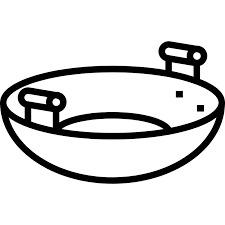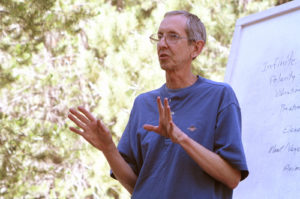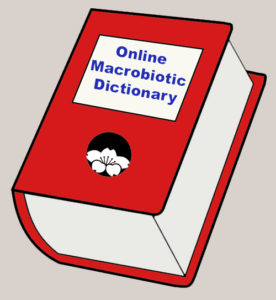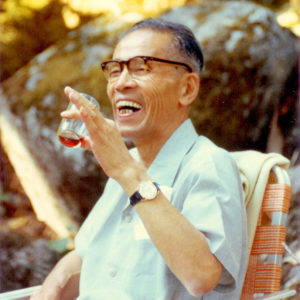
Completed Entries
Thick round vegetable slices.
Kelp-type sea vegetable of the brown algae family, native of Japan and very tender. Often used in soup or ground as a condiment. It is high in iron and calcium and, just like hijiki, is valuable during pregnancy.
One of many suggestions for macrobiotic cooking meaning to use whole foods as much as possible, for example throwing away the absolute minimum when cleaning and trimming vegetables. Herman Aihara called George Ohsawa “an original recycler” because he wasted nothing, including food, paper, money, or time, and encouraged his students to do the same.
Hot water to cover the feet used for blood circulation, kidney disorders, and insomnia.
See Cautionary note.
“What are whole foods? Those that are not refined, extracted, or made by synthetic chemicals. Therefore, refined flour, white bread, sugar, meat (this is only part of a cow), milk products (cream, cheese, etc. are part of milk), sugar products, etc. are not whole foods. All whole grains are whole foods. Small fish can be whole if you eat the head and tail. Eat vegetables, leaves, and roots. Whole foods contain all the nutrition and minerals needed. (Of course, some elements are contained in less quantity in certain foods than in others.) By eating whole foods, we will be able to maintain homeostasis and a good balance of nutrition in our blood, body fluid, and cells. By eating whole foods, we will be able to manufacture our own vitamins and enzymes. Therefore, by eating whole foods, we will be able to develop the ability of transmutation. When we acquire this ability, we will be able to live on grains and vegetables, transmuting these to animal protein and body cells.” Macrobiotics: An Invitation to Health and Happiness, 40-41.
Grains in which the bran, germ, and endosperm are still present in the same proportions as when they were growing in the fields. The bran contains B vitamins, fiber, and important antioxidants. The germ contains many B vitamins as well as some protein, minerals, and healthy fats. The endosperm contains starchy carbohydrates, proteins, and small amounts of vitamins and minerals.
Whole grains are the principal food of a macrobiotic practice. Organically grown grains are preferred when available. While short-grain brown rice is most frequently eaten because of its nutritive value and favorable sodium-to-potassium ratio, any whole grain may be eaten at any time. Whole grains range from moderately yang to slightly yin in the following approximate order: buckwheat, millet, teff, amaranth, short-grain brown rice, quinoa, whole wheat, rye, bulghur, sweet brown rice, medium-grain brown rice, pot (hulled) barley, wild rice, whole oats, corn, and long-grain brown rice.
Many whole grains are eaten in a partially processed form from time to time. Examples in slightly yang to slightly yin order include: lightly salted cracked wheat, lightly salted rice cakes, cracked rye, rice kayu, unyeasted whole wheat or rye bread, sourdough whole wheat or rye bread, brown rice cream, wheat flakes, rye flakes, mochi, buckwheat noodles, basmati rice, pearl barley, unsalted rice cakes, rolled oats (oatmeal) or steel-cut oats, corn grits, cornmeal, corn thins or cakes, chapatis, corn tortillas, couscous, whole wheat crackers, udon noodles, somen noodles, and ramen.
Refined or “enriched” grains may be used as a transition to a macrobiotic practice or for special occasions, but otherwise are generally avoided, especially by persons dealing with a major illness.
Boiled willow leaves water used as a compress for extensive burns.
See Cautionary note.
The relentless drive to discover the underlying cause of a disease through an understanding of the Order of the Universe and the origin, mechanism, structure, and usefulness of the disease.

Chinese round cooking pan.
Hot water with fireplace ashes at the bottom used as a compress for skin diseases.
See Cautionary note.
Projected Entries
War
Wasabi
Water
Watercress
Way of eating
Way of life
Weakness, general (anemia)
Weight loss
Western medicine
Wheat
Wheat germ
White miso
Whole wheat
Whooping cough
Wild rice
Wild Vegetables
Will
Wisdom
Women
Wonders
Words
World Government (weekly newspaper)
World Health Organization
Worms, round
Wounds
Questions or Comments?




